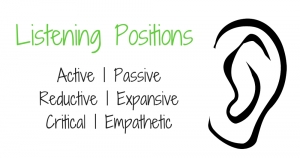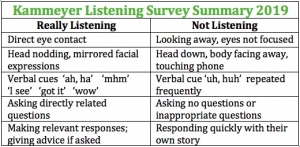Give the Gift of Listening
We all love to be heard. We can feel understood, validated, and truly connected in the presence of a good listener. It is not easy to listen in our times of excessive stimuli, noisy environments, and shorter attention spans. But the benefit of human connection and deeper understanding makes it worth the effort. What makes a good listener, and how can we give that gift to others? A recent anonymous survey of my professional network highlights elements of skillful and unskillful listening plus we can learn from experts.
Survey comments aptly express what we intuitively know about skillful listening.
“They are looking at you directly in the eyes and are engaged by asking questions that pertain to the information you are delivering or offering the advice you are asking for.”
“For deep listening, I tend to listen for my words, repeated back in their own words, but not with my prompting.”
We also have a good sense when others are not listening, or we are not fully listening.
“They are looking away or have a distracted look in their eyes.”
“They jump immediately to a story or example about them.”
“I catch myself constructing an answer or how to make my next point.”
“I am thinking about something else other than what the person is telling me about. Or, I am listening, but my goal is to find some hook to get out of the conversation.”
Practice the Art of Listening Well
While we all like to be heard, few of us are formally taught how to listen. In addition to taking the advice of our peers, we can learn from experts. Three core steps set us in the right direction.
- Be present.
- Set intentions and be deliberate.
- Give appropriate nonverbal and verbal responses.
First, we need to bring ourselves into the current time and place and set thoughts of the past and the future aside. Often focusing on the feeling of our feet on the ground and on the sight of another person brings us fully present. Once present, we can listen better by setting specific intentions such as understanding, problem solving, or a creating a sense of connectedness.
This Farnam Street blog highlights the importance of listening to create human connections and strengthen relationships. “A simple way to focus your attention is to listen with the intention of summarizing the other person’s point of view. This stops you from using your mental energy to work out your reply and helps store the other’s words in your memory as well as identify any gaps in your understanding so you can ask questions to clarify.”
Sound expert Julian Treasure highlights ‘listening positions’ that we hear from usually based on a compilation of our life experience. Our listening position, or mental stance, literally changes what we hear and how we hear it.  Active position is listening to be able to reflect back directly what we heard someone say and it is a powerful way to make others feel understood. In contrast, passive listening is suspending the meaning-making process and simply listening to the sound of someone speaking. When listening from a reductive position, we focus on getting to one answer vs. an expansive position where we hear broader possibilities arise. If we are listening from a critical position, we are hearing what can be improved vs. if we are listening from an empathetic position, we are hearing the emotional impact to the person speaking. There are no ‘right’ or ‘wrong’ listening positions. It is all about reading the current need of the speaker and setting intentions deliberately.
Active position is listening to be able to reflect back directly what we heard someone say and it is a powerful way to make others feel understood. In contrast, passive listening is suspending the meaning-making process and simply listening to the sound of someone speaking. When listening from a reductive position, we focus on getting to one answer vs. an expansive position where we hear broader possibilities arise. If we are listening from a critical position, we are hearing what can be improved vs. if we are listening from an empathetic position, we are hearing the emotional impact to the person speaking. There are no ‘right’ or ‘wrong’ listening positions. It is all about reading the current need of the speaker and setting intentions deliberately.
The third step is demonstrating to others that we are listening by providing nonverbal and verbal responses. When we are fully present and intentionally listening, we tend to naturally make eye contact, nod our heads, and give subtle verbal cues of encouragement. Our nonverbal responses reflect what is true – we are fully engaged. The appropriateness of our verbal responses depends on our read of the speaker’s need. An effective solution is to outright ask, ‘Are you looking for answers and advice or would you prefer a sounding board?’ so that the speaker can set us in the right direction.
Since we all love to be heard, let’s give the gift of listening to those around us by being present, deliberate, and giving appropriate responses.

